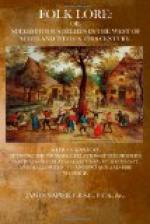“O let me propitious find,
And to the shepherd and his
sheep be kind;
Far from my flocks drive noxious
things away,
And let my flocks in wholesome
pastures stray.
May I, at night, my morning’s
number take,
Nor mourn a theft the prowling
wolf may make.
May all my rams the ewes with
vigour press,
To give my flocks a yearly
due increase.”
The Romans held another festival in honour of the goddess Flora. It began on the 28th April, and lasted three days. The people wore garlands of flowers, and carried them about with branches of newly-budded trees. There was much licentiousness connected with this feast.
Reference has already been made to another Roman festival which was celebrated early in May. This was called the Lamuralia, and its purport was to propitiate the favour of the ghosts or spirits of their ancestors. I am of opinion that the English May feasts are a survival of the Floralia, and, as kept during the middle ages, were not free from some of the indecencies of the Floralia. In my remembrance, the first of May, in the country west of Glasgow, was honoured by decking the houses with tree branches and flowers. Horses were also similarly decked. The Church did not attempt to abolish these heathen festivals, but endeavoured to dominate them, and substitute for legends of heathen origin connected with them legends of Church origin. In this they partly succeeded. The following account of the Beltane festival, as it was kept in some districts in Perthshire at the close of last century, taken from the statistical accounts of certain parishes, will shew how persistent these ancient customs were, and also how some other festivals latterly became amalgamated and identified with Beltane:—
“In the Parish of Callander, upon the first day of May,” says the minister of the parish, “all the boys in the town or hamlet meet on the moors. They cut a table on the green sod, of a round shape, to hold the whole company. They kindle a fire, and dress a repast of eggs and milk in the consistence of a custard. They knead a cake of oatmeal, which is baked at the fire upon a stone. After the custard is eaten up, they divide the cake into as many portions, and as similar as possible, as there are persons in the company. They blacken one of these portions with charcoal until it is perfectly black. They put all the bits of cake into a bonnet. Every one blindfolded draws a portion—he who holds the bonnet is entitled to the last. Who draws the black bit is the devoted person to be sacrificed to Baal, whose favour they mean to implore in rendering the year productive of substance for man and beast. There is little doubt of these human sacrifices being once offered in the country, but the youth who has got the black bit must leap through the flame of the fire three times.” I have myself conversed with old men who, when boys, were present at, and took part in these observances; and they told me that in their grandfathers’ time it was the men who practised these rites, but as they were generally accompanied with much drinking and riot, the clergy set their faces against the customs, and subjected the parties observing them to church discipline, so that in course of time the practices became merely the frolic of boys.




